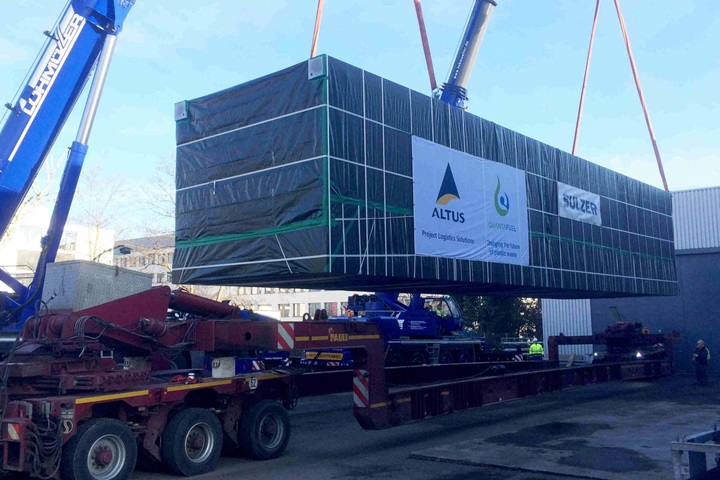- Naphtha from plastic waste
- HVGO from plastic waste
- LVGO from plastic waste
- Diesel from plastic waste
- Feedstock from plastic waste
- Aromatics / BTX from plastic waste
- Waxes from plastic waste
Mixed plastics pyrolysis
Purification of pyrolysis oils obtained from mixed plastics
- Modular approach for the recovery of naphtha, diesel, aromatics or other hydrocarbons from pyrolysis oils
- Hydrotreating solutions
- Skid-mounted systems
- Performance guarantees
- Simulation capacity in-house
- Technical-scale testing facilities available
Mixed plastics pyrolysis
While the accumulation of plastic continues to remain a global issue, the growing demand for plastic is adding to the problem. According to an article by McKinsey and Company (2018), the volume of plastic waste is slated to increase up to 460 million tonnes per year by the year 2030. To counter this, technology is required in order to recycle plastic chemically so that the volume of plastic waste will decrease globally.
One of the leading methods for chemical recycling of mixed plastics is pyrolysis. This chemical process involves the depolymerization of plastic waste into its raw materials in the absence of oxygen. One of the key products is a crude oil like product, which can be used as a fuel source or in turn used as chemical feedstock to create new plastic products and thus enabling a closed loop recycling.
The advantages of using pyrolysis to achieve the reduction of plastic waste is, that unlike mechanical processes, a true circularity without any inferior product qualities can be achieved. Plastic pyrolysis ensures that the quality of the recycled plastic (which is derived from the pyrolysis oil) is as good as virgin plastic – contrary to mechanical processes wherein the recycled plastic becomes downgraded after several cycles of processing.
Since pyrolysis is viable when there is a steady stream of plastic waste available as feedstock, it can be considered a good counter measure against the growing volume of waste generated. Since using this process will ensure a circularity in plastic production, it will be a good mitigation measure against environmental pollution and will bring in an accountability for all the waste that is being generated worldwide.
Purification technologies
Pyrolysis oil, recovered from mixed plastics can contain a broad range of hydrocarbon species next to impurities like Halogens, Sulphur, Oxygen or Nitrogen containing components or Oxygenates. Our modular approach allows our customers to recover high-purity hydrocarbons from a broad range of pyrolysis oil qualities. For certain applications, our units can be delivered as skid-mounted solutions.
- Quenching: In plastics pyrolysis processes, the products of the reaction are in general present as in gas phase. Sulzer’s quenching technologies allow the rapid cooling and condensation of the products to stop the reaction and to allow further processing.
- Hydrotreating: Sulzer's hydrotreating technology removes heteroatoms such as Sulphur, Chloride, and Nitrogen as well as oxygenates. Olefins present in the oil get saturated.
- Fractionation: The purified pyrolysis oil can then be fractioned using Sulzer’s leading distillation technologies. Commonly, fractions with naphtha or diesel quality are recovered in the unit. Recovered light fractions can be used to heat the pyrolysis reactor.
- BTX recovery: Sulzer Chemtech’s GT-BTX® technology allows the recovery of aromatics like benzene, toluene, and xylene from pyrolysis oils. These valuable products can be used directly in the petrochemical industry.
- Wax and oil recovery: Plastics pyrolysis oils can be an alternative source to crude-oil-based feedstocks for waxes and oils. Sulzer’s deoiling and dewaxing technologies allow the recovery of valuable products for the use in several applications
Quantafuel
Sulzer Chemtech’s leading separation technologies are playing a key role in Quantafuel’s first processing plant in Denmark, which turns mixed plastic waste into valuable recycled chemicals and fuel. By successfully supporting this ambitious and visionary project, Sulzer continues to strengthen its position as the go-to choice for high-quality, reliable and efficient mass transfer solutions and associated services.
Sulzer Chemtech, the leader in separation and mixing technology, has completed the installation of a distillation unit for Quantafuel’s first full-scale plant in Skive, Denmark. The equipment is crucial to the facility, which will be able to process 60 tonnes of unrecyclable plastic to generate 48 tonnes of hydrocarbons daily. These will then be used as fuel or to produce a wide range of useful chemicals.
In order to combat plastic pollution, the chemical recycling start-up, Quantafuel, has developed an innovative process that can considerably decrease the volume of non-recycled plastic waste while reducing the usage of natural oil and gas resources in the petrochemical industry. The novel conversion process consists of two depolymerization steps - to produce alkanes - and a distillation stage to separate different hydrocarbon fractions.
Due to the importance and complexity of the last operation, Quantafuel chose Sulzer Chemtech, with its extensive knowledge and expertise in mass transfer technology as well as advanced manufacturing capabilities. In particular, Quantafuel wanted a reliable partner that could deliver the required distillation plant quickly. Thanks to Sulzer’s ability to provide high-quality skid-mounted units and plants, Quantafuel could maximize its speed to market whilst benefitting from substantial cost savings.
Kjetil Bøhn, CEO at Quantafuel, comments: “Sulzer’s specialists supported us throughout the project, and their input was fundamental to the quick and successful completion of the plant. This is why we are now discussing future plans together.”
Contact our Innovations team below

